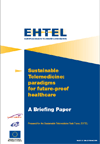 With this Briefing Paper, EHTEL would like to offer all stakeholders, i.e. politicians, citizens/patients, health professionals, healthcare providers, health insurers and many others a snapshot of the State of the Art on the European, National and Regional levels with the focus on sustainable services. Based on a summary of what has been achieved - particularly in the form of routinely used (but often still small scale) telemedicine services across Europe - a set of recommendations towards a "Vision for Europe 2020: Integrated Telemedicine Services" is established.
With this Briefing Paper, EHTEL would like to offer all stakeholders, i.e. politicians, citizens/patients, health professionals, healthcare providers, health insurers and many others a snapshot of the State of the Art on the European, National and Regional levels with the focus on sustainable services. Based on a summary of what has been achieved - particularly in the form of routinely used (but often still small scale) telemedicine services across Europe - a set of recommendations towards a "Vision for Europe 2020: Integrated Telemedicine Services" is established. Telemedicine services respond to today's health and social demands, i.e. treatment of chronic patients, support for the quality of life of elderly people living at home and they also support the patient empowerment of well-informed citizens to make healthcare choices.
The 2004 eHealth action of the European Union (eHealth - making healthcare better for European citizens: An action plan for a European eHealth Area), which is the current guideline for the implementation of the EU's vision on eHealth and forms an important part of European i2010 strategy, mentions telemedicine services as an upcoming milestone: "By end 2008, the majority of European health organisations and health regions (communities, counties, districts) should be able to provide online services such as teleconsultation (second medical opinion), e-prescription, e-referral, telemonitoring and telecare." Given this objective the EU will intensify the attention towards Telemedicine services in 2008.
Download Sustainable Telemedicine: Paradigms for Future-Proof Healthcare (.pdf, 1.176 KB).
Download from the eHealthNews.EU Portal's mirror: Sustainable Telemedicine: Paradigms for Future-Proof Healthcare (.pdf, 1.176 KB).
For further information, please visit:
http://www.ehtel.org
Related news articles:
About EHTEL
EHTEL (The European Health Telematics Association) was founded in 1999 as is a membership driven European association. Representing approximately 100 organisations and individuals in 30 countries in Europe and beyond who are key actors in the field of ehealth, EHTEL members include healthcare authorities & government services, healthcare professionals, patients, citizens and consumers associations; industry groups, insurers, international and national not-for-profit associations, researchers, and independent consultants.
EHTEL provides a platform to all European eHealth stakeholders in order to exchange information, to identify challenges and find solutions towards realising its goals of promoting eHealth tools to improve the quality of health for patients and citizens, access to services, efficiency of care and cost effectiveness.
EHTEL provides a number of communications services to its members, actively advocates on the above issues towards public institutions and works through established task forces to achieve these goals. For more information on EHTEL visit www.ehtel.org.
About Sustainable Telemedicine: paradigms for future-proof healthcare
The report provides for politicians, healthcare professionals, providers and insurers as well as other stakeholders a snapshot of the state of the art of European, national and regional level progress towards sustainable telemedicine services. A detailed description of existing pilot projects is annexed to the report for the information of EHTEL members and for media inquiries.
Telemedicine is about interaction between either a patient and a health professional or between two or more health professionals without direct physical contact. It boasts a long history in the provision of medical care over a distance starting from telephone and video consultations. Today most of the medical specialties have a "tele"-sister, like teleradiology (the most frequent usage), telepathology, teledermatology and many more.
Whereas in the past, the majority of consultations only indirectly involved patients, i.e. were D2D (doctor-to-doctor) encounters, services directly offered to patients (D2P, doctor-to-patient) are very quickly emerging today. Those services might be embedded in a case management programme, like telemonitoring supported by a telemedicine service centre provided medical expertise or offered via health portals. As a parallel and stable stream also niche acctivities exist in aviation, maritime, space, defence and disasters settings, where teleconsultation and remote monitoring are often the only option to establish a patient encounter with a general practitioner or medical specialist.
The current paradigm shift in telemedicine is expected to respond to increasing demand for health and social care due to an increasing number of chronic patients suffering from for example chronic heart failure or diabetes. It is also seen as major contributor to supporting the quality of life of elderly people living at home.
However, nation-wide use of telemedicine services is currently delayed due to long testing phase of both EU and nationally funded telemedicine pilot projects. Lengthy pilot phases are due to the lack of a global vision of the role of eHealth in the transformation process of healthcare and the lack of, until recently appropriate and ready to use interoperable and secure - communication infrastructures, poorly documented and unproven return on investment models, the unclear and restrictive legal environment and most particularly the lack of reimbursement schemes for telemedicine by statutory as well as private health insurance schemes.